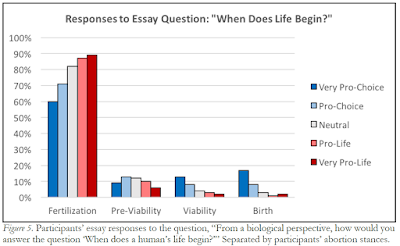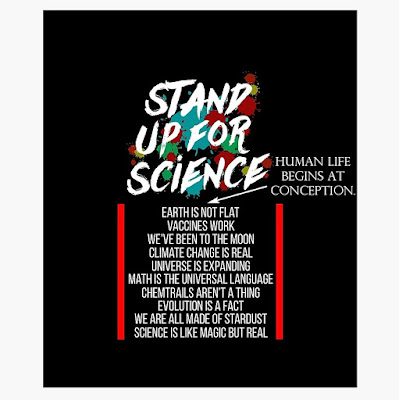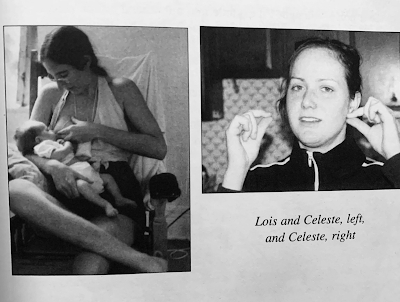Even very pro-choice biologists acknowledge a human life begins at fertilization.
If you haven’t already, you should really read Biologists’ Consensus on ‘When Life Begins’, a dissertation by Steve Jacobs out of the University of Chicago. This blog post is going to be long, so here’s the summary:
- Most Americans think “When does human life begin?” is an important question that people deserve to know the answer to so they can be informed about their reproduction decisions.
- Most Americans think the group best suited to answer this question is biologists because Americans view this as an objective issue that can be informed by scientific knowledge.
- Over 90% of biologists, including 69% of “very pro-choice” biologists and 80% of “pro-choice” biologists, affirm a human life begins at fertilization.
There’s a lot of communication breakdown in the abortion debate because “when life begins” can be either a scientific or philosophical question (or, as Jacobs puts it, a descriptive or a normative question). Often, people switch between these two approaches without even noticing. For example:
A human life begins at fertilization, so fetuses deserve legal protection throughout all of pregnancy.
This argument starts with a scientific fact and ends with a philosophical position without explaining how the speaker went from the first to the second. Here is sort of the reverse:
No one has the right to use another person’s body, so the fetus isn’t really a separate life until viability.
The speaker starts with a philosophical position and tries to use it to assert a scientific claim. Both examples are sloppy, slipping between science and philosophy without noticing or talking about it.
Jacobs decided to dig deeper into this communication breakdown. Do most Americans think the beginning of human life is a biological question or a philosophical one? Do they think the question matters in terms of the abortion debate? Who would they consider authoritative sources on this question? And what do those in authority (according to American opinion) think the answer is?
Our philosophical views stem from our scientific understanding
Before Jacobs explains his methodology and results, he does a great job reviewing how our society has traditionally viewed the interplay between science and philosophy on this issue. He cites historical examples demonstrating that people have generally believed that the philosophical (normative) flows from the biological (descriptive): whenever we know, scientifically, that we are dealing with a human life, we should protect that human. This was true even when people weren’t sure about fetal life until they could feel the baby kick: once they could feel that kick, they thought that life should be protected. And when we learned the human in the womb was alive quite a bit earlier, we outlawed abortion quite a bit earlier.
Even in Roe v. Wade, this connection between science and philosophy didn’t change: SCOTUS didn’t say “Yes, of course the embryo is a human life but abortion should be legal anyway for XYZ reasons.” Instead SCOTUS asserted that we can’t know when human life starts, and only with that lack of knowledge can we justify abortion. During oral arguments the justices and attorneys involved openly acknowledged that if we recognized the fetus as a human person, Roe v. Wade would have been “almost an impossible case”:
Justice Potter Stewart: Well, if it were established that an unborn fetus is a person within the protection of the Fourteenth Amendment, you would have almost an impossible case here, would you not?
Ms Weddington [attorney representing Jane Roe]: I would have a very difficult case.
Justice Potter Stewart: You certainly would because you’d have the same kind of thing you’d have to say that this would be the equivalent to after the child was born.
Ms Weddington: That’s right.
Justice Potter Stewart: If the mother thought that it bothered her health having the child around, she could have it killed. Isn’t that correct?
Ms Weddington: That’s correct.
As Jacobs summarizes:
Courts and lawmakers have a long and consistent history of using a fetus’ developmental landmarks to form their view on when a fetus is classified as a human, which they then use as the bright line that separates legal abortions from illegal abortions.
In other words, historically the biological question of when human life begins has mattered a lot to society, especially in terms of abortion. But does it still?
Yes, it does.
Most Americans think “When does a human’s life begin?” is an important question, best answered by biologists.
Jacobs surveyed 2,899 American adults. Here’s a quick overview of the questions and results:
- “How important is the question ‘When does a human’s life begin?’ in the US abortion debate? (1 = unimportant, 10 = important)” 87% rated the question as important
- “Americans deserve to know when a human’s life begins so they can be informed in their abortion positions and reproductive decisions. (1 = do not agree, 10 = agree)” 84% agreed
- “Which group is most qualified to answer the question ‘When does a human’s life begin?’”
- Biologists (81%)
- Religious leaders (7%)
- Voters (7%)
- Philosophers (4%)
- Supreme Court Justices (2%)
- “Why do you think they are most qualified?” 91% of those who chose biologists argued that when life begins is an objective issue and biologists’ scientific knowledge makes them best suited to resolve the issue
The vast majority of biologists—even most pro-choice biologists—affirm a human life begins at fertilization.
- 63% were non-religious,
- 85% were pro-choice, and
- 95% held a PhD.
- Implicit statement A: The end product of mammalian fertilization is a fertilized egg (‘zygote’), a new mammalian organism in the first stage of its species’ life cycle with its species’ genome.
- Implicit statement B: The development of a mammal begins with fertilization, a process by which the spermatozoon from the male and the oocyte from the female unite to give rise to a new organism, the zygote
- Explicit statement: In developmental biology, fertilization marks the beginning of a human’s life since that process produces an organism with a human genome that has begun to develop in the first stage of the human life cycle
- 92% of very pro-life biologists
- 92% pro-life
- 86% neutral
- 80% pro-choice
- 69% very pro-choice
 |
| Figure 3 from the dissertation. Click to enlarge. |
Most participants wrote about various points during pregnancy: when the sperm fertilizes the egg, when the zygote implants in the uterus, cell differentiation, neurogenesis, the first heartbeat, the first brain waves, the first pain response, fetal viability, and birth.
Jacobs categorized every answer that was after fertilization but before viability as “pre-viability.” The results, broken down by the biologists’ abortion stances, are as follows:
 |
| Figure 5 from the dissertation. Click to enlarge. |
Unsurprisingly, very pro-choice biologists were more likely to choose an answer other than fertilization, and significantly more likely to say that—again, from a biological perspective—life begins at birth (can’t decide if this is hilarious or sad). Still, the strong majority of all biologists—even very pro-choice biologists—affirmed that a human’s life begins at fertilization.
I assume this means we can now add “life begins at conception” to the pro-science memes, right?
Further Reading:
- The Fundamental Question of the Abortion Debate: A Response to Nathan Nobis
- Human Beings Begin as Zygotes: Refutations to 8 Common Pro-Choice Arguments
- When we say “heartbeat” we don’t mean “fetal pole cardiac activity.” We mean “heartbeat.”
- Pro-choice embryologist contradicts his own biology textbook
- Embryologist Moonlights as Philosopher. SPL calls BS.
- Biology textbook writer claims we need emotion to answer “When does human life begin?”
- Dear Bill Nye: Where’s the science, guy?
Other Sources:
- The Scientific Consensus On When Life Begins (scientific articles and texts affirming a human life begins at fertilization) – Illinois Right to Life
- A pro-life response to “The unscientific nature of the concept that ‘human life begins at fertilization,’ and why it matters” – The Fetal Position
- A Scientific View of When Life Begins – The Charlotte Lozier Institute
- Pro-Choice Concedes – quotes from abortion providers and other PC organizations acknowledging abortion destroys live humans – Human Defense
If you appreciate our work and would like to help, one of the most effective ways to do so is to become a monthly donor. You can also give a one time donation here or volunteer with us here.



Leave a Reply
Want to join the discussion?Feel free to contribute!